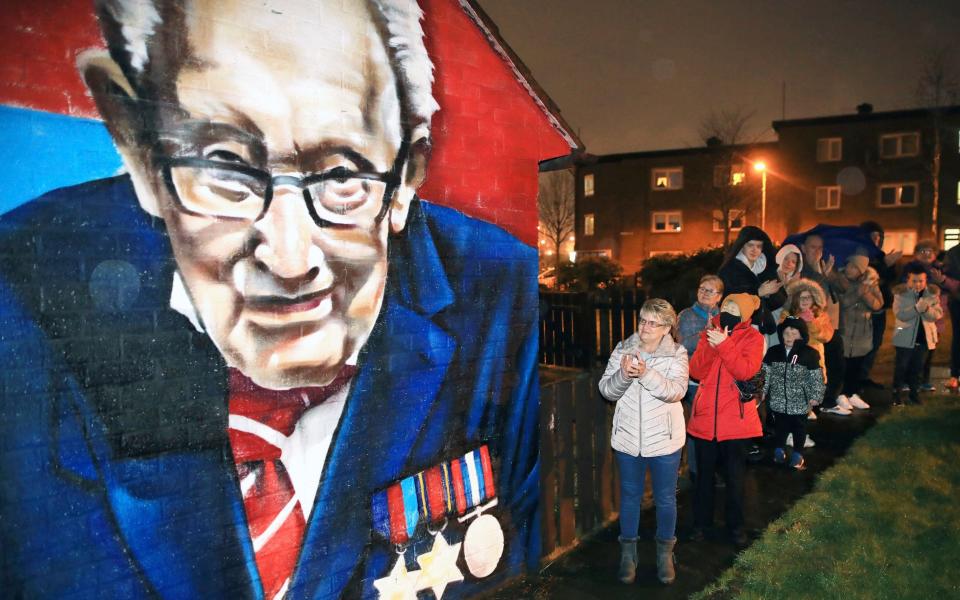Captain Tom’s daughter is likely to have “misled” supporters of a charity set up in his memory that offered branded rosé wine, books and gin, the charity watchdog has found.
Hannah Ingram-Moore was branded “disingenuous” and “misleading” while running the Captain Tom Foundation, according to a report released on Thursday by the Charity Commission.
The watchdog found she and her husband, Colin, gained significant personal benefit from the foundation, with the commission concluding that there had been repeated instances of misconduct by both.
David Holdsworth, the chief executive of the watchdog, said the foundation “has not lived up to that legacy of others before self, which is central to charity”.
The Ingram-Moores made more than £1 million through their association with the charity, the report found.

Captain Tom Moore raised £38.9 million for NHS charities by walking 100 laps of his garden before his 100th birthday in April 2020, at the beginning of the Covid pandemic. He was later knighted and died in February 2021.
The Captain Tom Foundation was set up in May 2020, outlining a wide-ranging set of objectives including the “advancement of health and wellbeing” and “promotion of social inclusion”.
The couple was appointed trustees in February 2021, with Mrs Ingram-Moore becoming interim chief executive in August 2021.
But both were banned from being charity trustees earlier this year following a Charity Commission investigation, launched in June 2022.

Mrs Ingram-Moore also claimed that she was paid for an appearance at an awards ceremony – for which she was paid £18,000 – which was undertaken in a personal capacity.
However, the commission disagreed, saying there was no evidence to support this, and the charity received just £2,000, separately to her fee.
The couple acknowledged that the use of the foundation’s name in an initial planning application for a spa pool block at their home was an “error”. However, they said this was a result of the fact they had been “busy undertaking global media work”.
The block was demolished earlier this year after the family lost an appeal against Central Bedfordshire council’s order for it to be torn down.

On Thursday, a 30-page document setting out its findings revealed a “repeated pattern of behaviour” when it came to “misconduct and/or mismanagement” of the charity.
The report found that the way in which Captain Tom-branded alcohol, including gin and rosé, was sold was likely to have “misled” supporters who believed they were contributing to the charity.
Drinks were among merchandise sold by CTV, a company controlled by the Ingram-Moores, with the agreement that the foundation would receive 15 per cent of its online merchandise sales.
However, some products were not sold directly from the online store, and customers were redirected to other websites instead, meaning the charity would not receive donations. It is not clear if the Ingram-Moores benefited from these sales financially.
The report said: “The inquiry found that it was only the branded T-shirts procured and sold directly by CTV that resulted in the 15 per cent donation.”
It added: “Limited information, coupled with the variety of different donation amounts and arrangements, is likely to have confused or misled supporters of the charity looking to contribute via the online store.”
An advance of £1,466,667 for a three-book deal, paid to Club Nook Ltd, a company of which the Ingram-Moores are directors and hold shares with their two children, also came under scrutiny.

The titles were Captain Tom’s autobiography, Tomorrow Will Be a Good Day, and two further titles – One Hundred Steps and Captain Tom’s Life Lessons.
Publisher Penguin Random House (PRH) told the commission that there was an “informal understanding” that the war veteran’s family were “planning to use part of the advance to set up and launch a new charity”.
This was echoed in the prologue of Tomorrow Will Be a Good Day, where Captain Tom wrote: “[W]ith the offer to write this memoir I have also been given the chance to raise even more money for the charitable foundation now established in my name.”
However, no part of the advance was used to support the charity – and when the commission wrote to the Ingram-Moores in 2022 to offer them the chance to make a donation, they declined twice to do so.
The commission found the public had a “reasonable expectation that the Captain Tom books they purchased … would have financially benefited the charity” and “would understandably feel misled given no donation has been made to the charity”.
Mrs Ingram-Moore was also found to be “disingenuous” when discussing her own salary negotiations in television interviews for her chief executive role.
In an interview on ITV’s This Morning, she denied reports that she had been offered a six-figure salary of £150,000.

While the report said her denial was accurate as the Charity Commission had “only agreed to authorise a salary of £85,000”, it found that she had been “disingenuous, as the evidence demonstrates she was very much involved in the discussions around setting her salary and clearly influenced the initial proposal submitted to the commission to employ her on a salary of £100,000”.
The report further noted that an email sent by Mrs Ingram-Moore to a trustee made it clear that she had stated “salary expectations … in the region of £150,000”.
The charity watchdog acknowledged that the pandemic and “unprecedented media interest” in Captain Tom would have amounted to an “extremely stressful situation” for his family, which was only compounded by his death in February 2021.
Yet it concluded “that there were serious and repeated instances of misconduct and/or mismanagement in the administration of the charity in respect of the conduct and actions of Mr and Mrs Ingram-Moore”.
The watchdog’s chief executive said its report had found “repeated failures of governance and integrity” and that its inquiry had been fair, balanced and independent.

Mr Holdsworth added: “The public, and the law, rightly expect those involved in charities to make an unambiguous distinction between their personal interests and those of the charity and the beneficiaries they are there to serve.
“This did not happen in the case of the Captain Tom Foundation.
“We found repeated instances of a blurring of boundaries between private and charitable interests, with Mr and Mrs Ingram-Moore receiving significant personal benefit.”
The commission has not called on the foundation – which stopped taking donations in the summer of 2023 – to close, but a lawyer for the family previously indicated the charity might shut down.
After being banned as trustees, the Ingram-Moores released a statement in July describing the investigation as a “harrowing and debilitating ordeal”.
A PRH spokesman said: “In 2020 we entered into a publishing agreement in good faith and, as the report notes, this was on the understanding that a donation would be made to help facilitate the creation and launch of a new charity.
“We are extremely disappointed to read the findings of the report which indicate that this was not the case.”
A spokesman for the Captain Tom Foundation said it is “pleased with the Charity Commission’s unequivocal findings regarding the Ingram-Moores’s misconduct”.
They added: “We join the Charity Commission in imploring the Ingram-Moores to rectify matters by returning the funds due to the foundation, so that they can be donated to well-deserving charities as intended by the late Captain Sir Tom Moore.”
The Telegraph has contacted the Ingram-Moores for comment.
EMEA Tribune is not involved in this news article, it is taken from our partners and or from the News Agencies. Copyright and Credit go to the News Agencies, email news@emeatribune.com Follow our WhatsApp verified Channel




